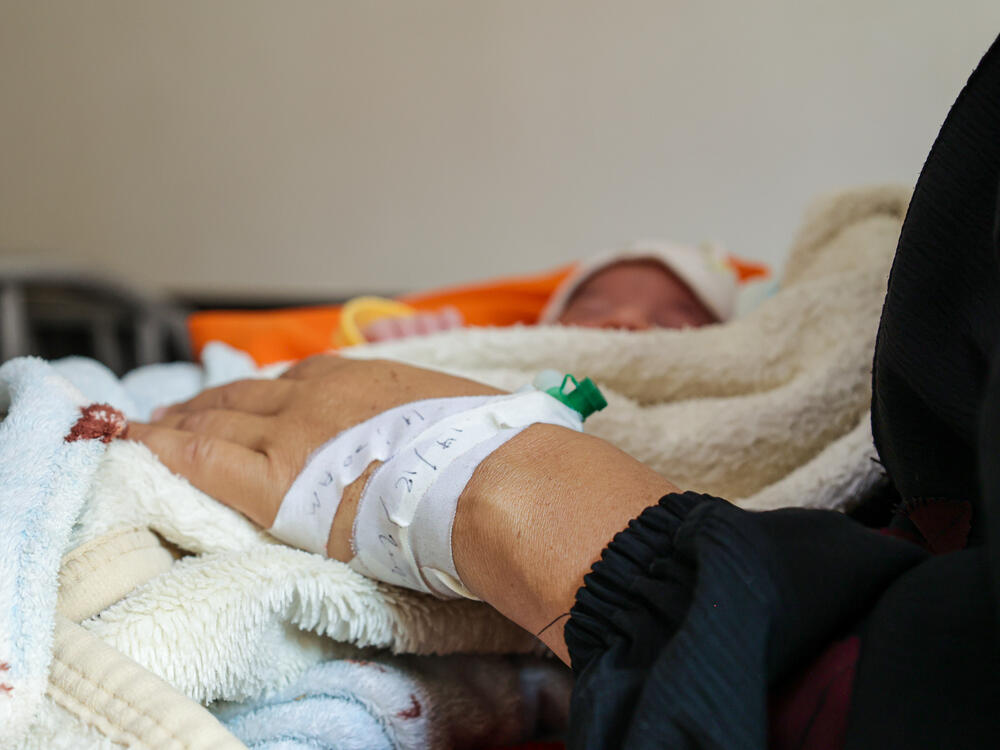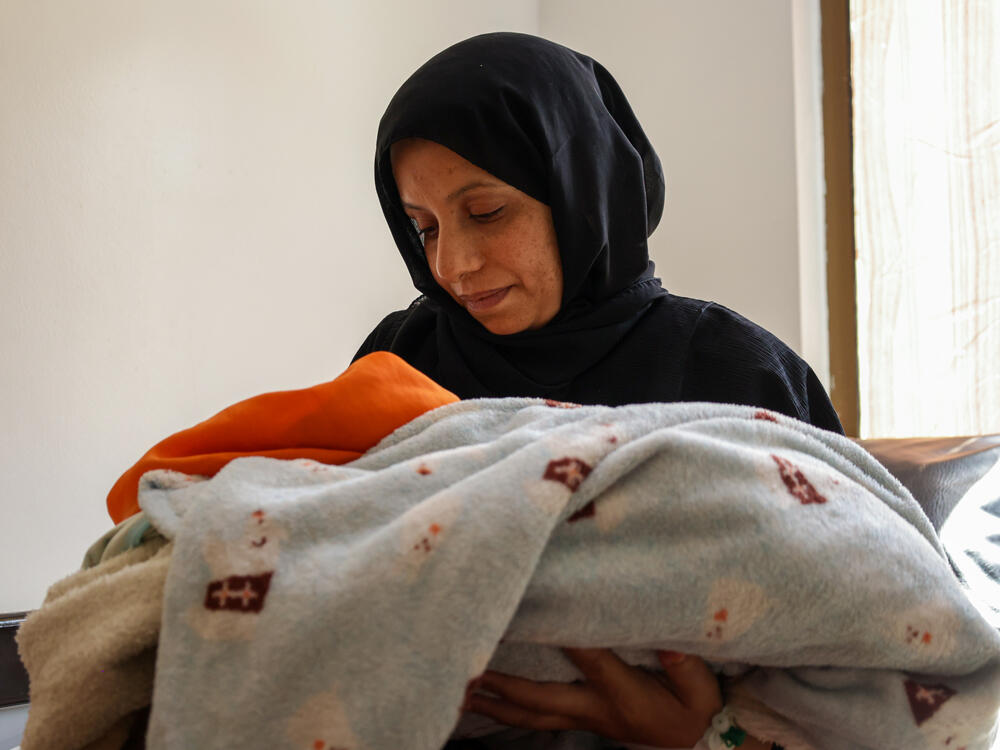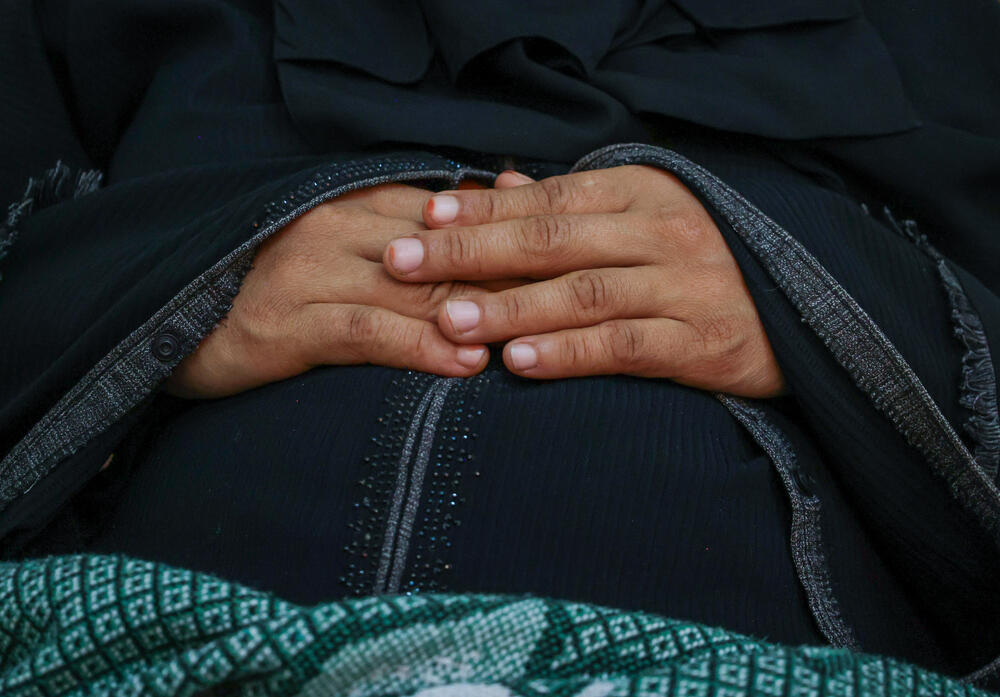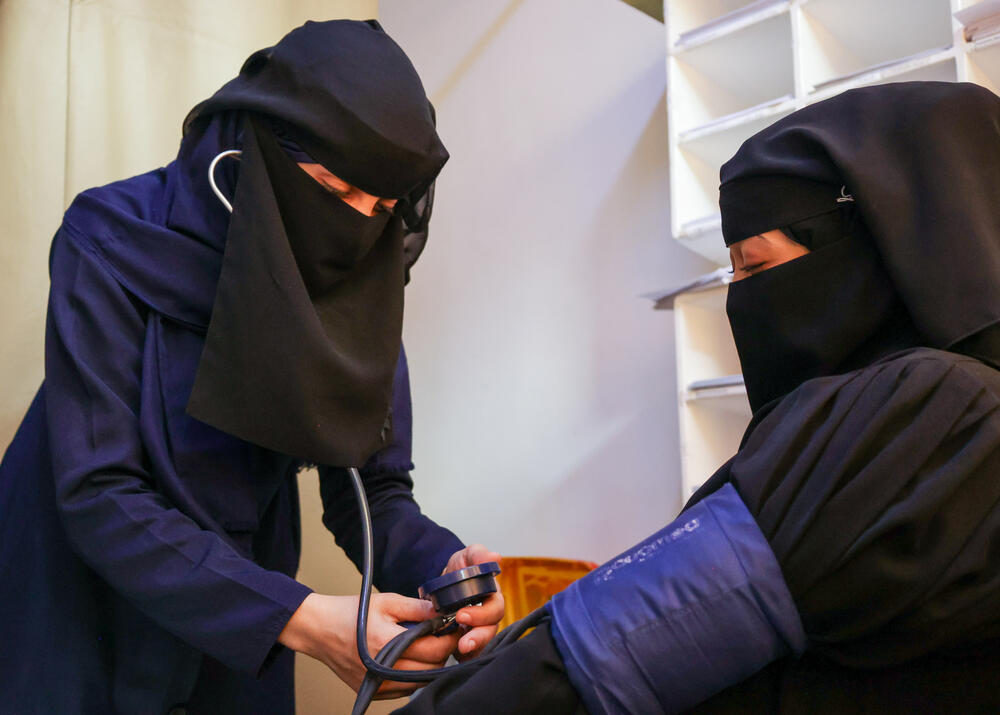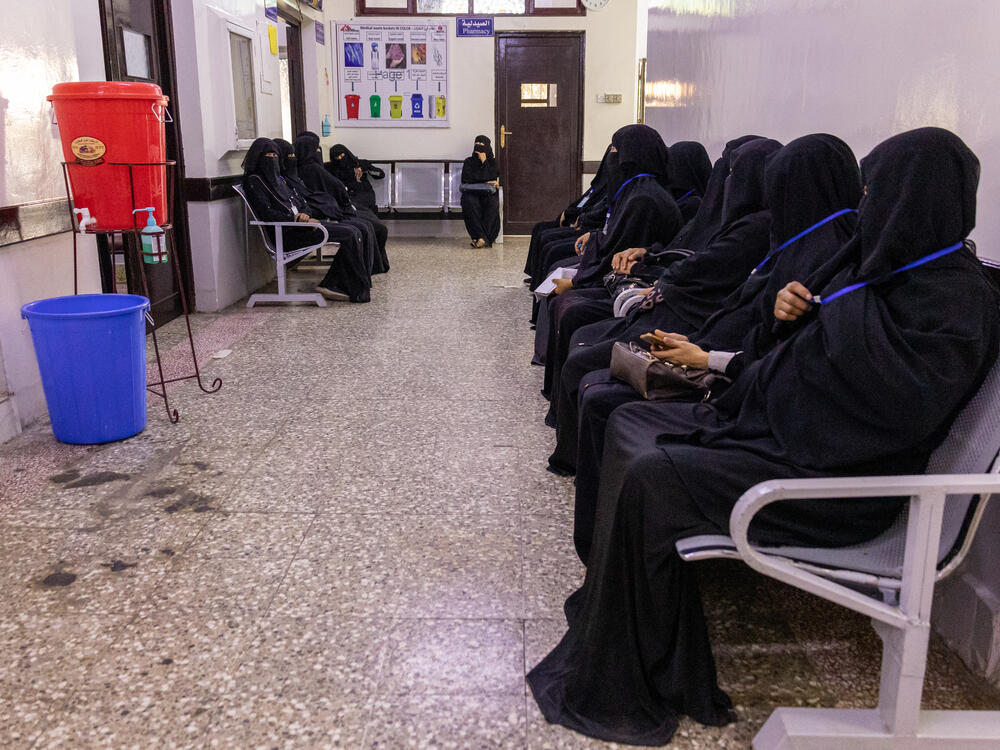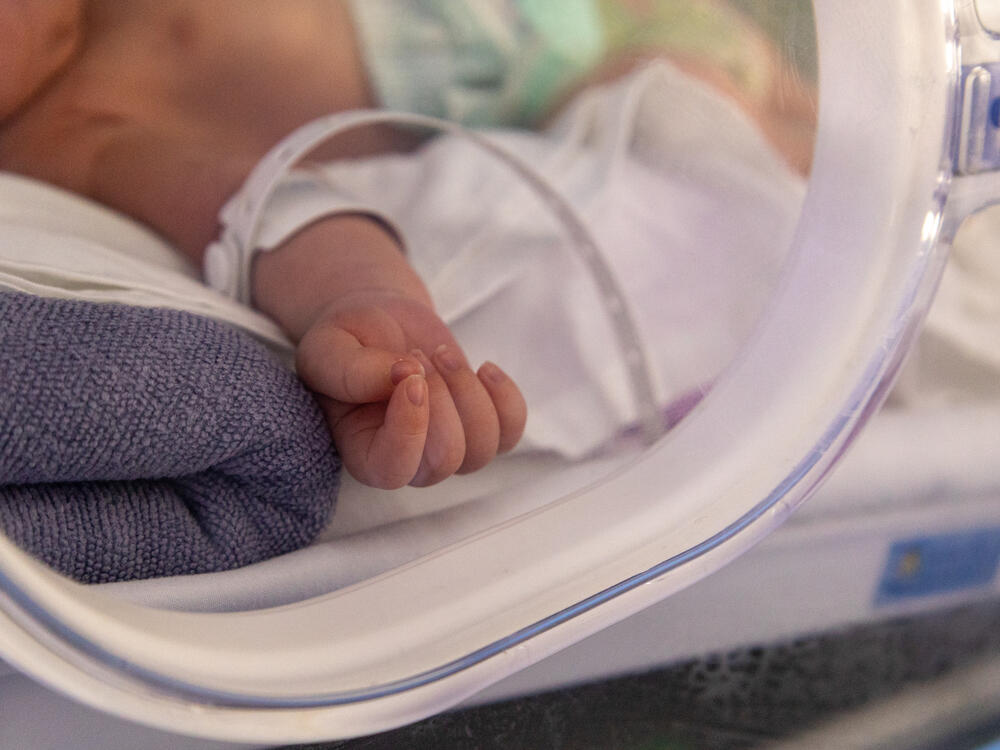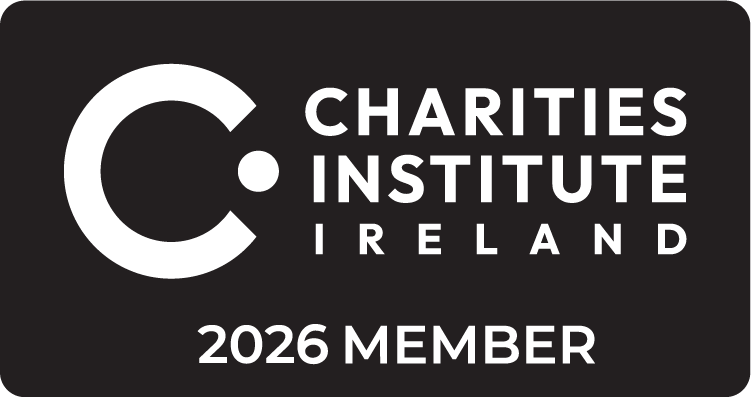Yemen: Giving birth in the face of persistent obstacles in Taiz
1 February 2023
Nogood Mohammad Ahmed Shamsan was lying under the covers of her bed, exhausted. She rested her left hand on her belly trying to provide comfort while she drew long, slow breaths. Next to Nogood was her mother sitting in a chair, making sure that her daughter was comfortable and that she tended to her needs. However, both Nogood and her mother had their heads turned to the side looking towards where the other hand of Nogood was. Under Nogood’s right arm, one-day-old Ahmed was sleeping, grabbing on the nest of blankets that surrounded him.
Nogood was admitted to the post-operative ward of after delivering Ahmed through caesarean section at the maternity unit in the Al-Jamhouri hospital, in Taiz city, Yemen. Doctors Without Borders/Médecins Sans Frontières (MSF) and the Ministry of Health (MoH) have been running the maternal and neonatal services in the hospital together since May 2021. MSF provides technical support, financial incentives to the Ministry of Health’s staff, and medical and logistical supplies to run the maternity unit including services such as caesarean sections, antenatal and postnatal care, family planning, vaccination and neonatal care.
A nearly-collapsed health system and access obstacles
More than eight years of war in Yemen is taking a devastating toll on people in many ways, including the ability to reach quality and timely healthcare, which is becoming increasingly challenging. Fewer than 50 percent of healthcare structures in Yemen are functioning. Most primary healthcare centres are only partially functioning due to lack of equipment, medical supplies, or medical staff. Since 2016, healthcare workers haven’t been paid monthly salaries on regular basis, forcing many to find alternative employment to make a living. This situation drives people to seek available and free healthcare in the closest possible area – a task that is not always easy.
"I came to Al Jamhouri hospital to have my caesarean section...There is only one health centre in the village, but it is not qualified because of the equipment that is not available there."
Like Nogood, many women travel long distances to deliver their babies at Al Jamhouri hospital. “I come from Bani Oman, a village,” said Nogood. “My financial situation is not that good, so I came to Al Jamhouri hospital to have my caesarean section, because it is free-of-charge. There is only one health centre in the village, but it is not good. It is not qualified because of the equipment that is not available there,” Nogood said.
“It took me two hours to come here,” said Bushra Khaleed Abdualrahman*, who is eight months pregnant. Bushra’s brother brought her to the hospital for emergency medical care hospital from Sabr Al Shaqeb area. “The roads are destroyed, and our route is mountainous,” said Bushra. “We live on a mountain, so after the rain the road becomes worse and worse. I was in pain and due to the arduous journey, I became so unwell.”
"The roads are destroyed, and our route is mountainous."
After many years of fighting, Taiz is still divided in two: Taiz city—controlled by the administration of the internationally-recognized government of Yemen—and the suburb of the city Al-Houban—which is in the Ansar Allah-controlled part of Taiz governorate. The frontline runs through the city is littered with landmines and guarded by snipers. To reach Taiz city, people must take the long, perilous journey through the mountains to avoid crossing the frontlines. Prior to the conflict, it took 10 minutes to reach Taiz city from Al-Houban—now it takes between five and eight hours. This is the route many people have to take to reach free, quality healthcare at the MSF-supported Al Jamhouri hospital.
Pregnant women living in rural areas come to the hospital with high risk and/or complicated pregnancies that could have been avoided, stemming from a lack of consistent ANC antenatal and post-natal and PNC monitoring, either due to absence of the services or the necessary medical specialties and basic equipment, like ultra sound machines, to perform them. Between August 2021 and August 2022, MSF’s team in Al Jamhouri hospital assisted 6,739 deliveries, out of which 4,184 were normal deliveries; almost 29 percent required caesarean sections - an indication of the high number of complex pregnancies arriving to the hospital.
“The first time that I had pain I went to a doctor in my area and they just gave me first aid,” said Bushra. “There is no equipment or machines and that’s the only thing they were able to do.”
According to Mduduzi Chandawila, MSF's medical team leader in Taiz city, most of the women that come to Al Jamhouri hospital from remote locations have rarely attended antenatal care consultations. “It’s a challenge,” said Mduduzi Chandawila. “Some of the high risk pregnancies that come to antenatal care here in Al Jumhouri hospital are coming for the first time. Some of them are already in their eight or ninth month of pregnancy.”
A lack of community health promotion
The nearly collapsed health system, compounded by access obstacles – mainly due to the insecurity and availability and affordability of health services - and the lack of community health promotion of healthy habits such antenatal and postnatal care that can be lifesaving, gravely impact the pregnancies of women and put their life and their babies’ at risk.
“Most of the women that are seen attending our services, for antenatal care for example, are presenting late or they are patients that are at high-risk pregnancies” said Chandawila. “These are women that have had some surgery before, like a cesarean section, some that have done the procedure two or three times. Others arrive with pre-conditions like eclampsia or pre-eclampsia—serious complications that need to be monitored closely and we need to carefully tend to patients that will not do normal delivery.”
MSF provides health promotion to spread awareness about the importance of antenatal and postnatal care. An MSF health promotion team shares information in the waiting areas of the maternity ward while and conducts broader community outreach.
“Through antenatal care, health conditions can be identified early in terms of way to deliver or the mode of delivery, what support they need, and what medication or treatment they need before they deliver,” said Chandawila. Postnatal care is also very important so that we can monitor the progress of the post-delivery period, we can monitor the surgical side, infections and other complications that may develop.”
The maternity unit at Al-Jamhouri hospital assists approximately 520 deliveries per month. After MSF began supporting the maternity unit, there was a sharp reduction in neonatal mortality and increase in antenatal and postnatal consultations. Between August 2021 and August 2022, neonatal mortality rate reduced from approximately 24 percent to 10 percent. Antenatal and postnatal consultations also increased, as in in August 2021, MSF in Al-Jamhouri hospital conducted 1,364 ANC consultations and 86 PNC consultations, whereas in August 2022 it remarkably rose to 1,795 ANC consultations and 527 PNC consultations.
While these numbers are encouraging, gaps remain. Timely access to primary healthcare is vital but remains a challenge, especially for pregnant women who should regularly monitor from the beginning of their pregnancies to avoid medical complications for them and their babies’ and in several cases, prevent maternal and neonatal deaths.
*Name changed to protect anonymity
